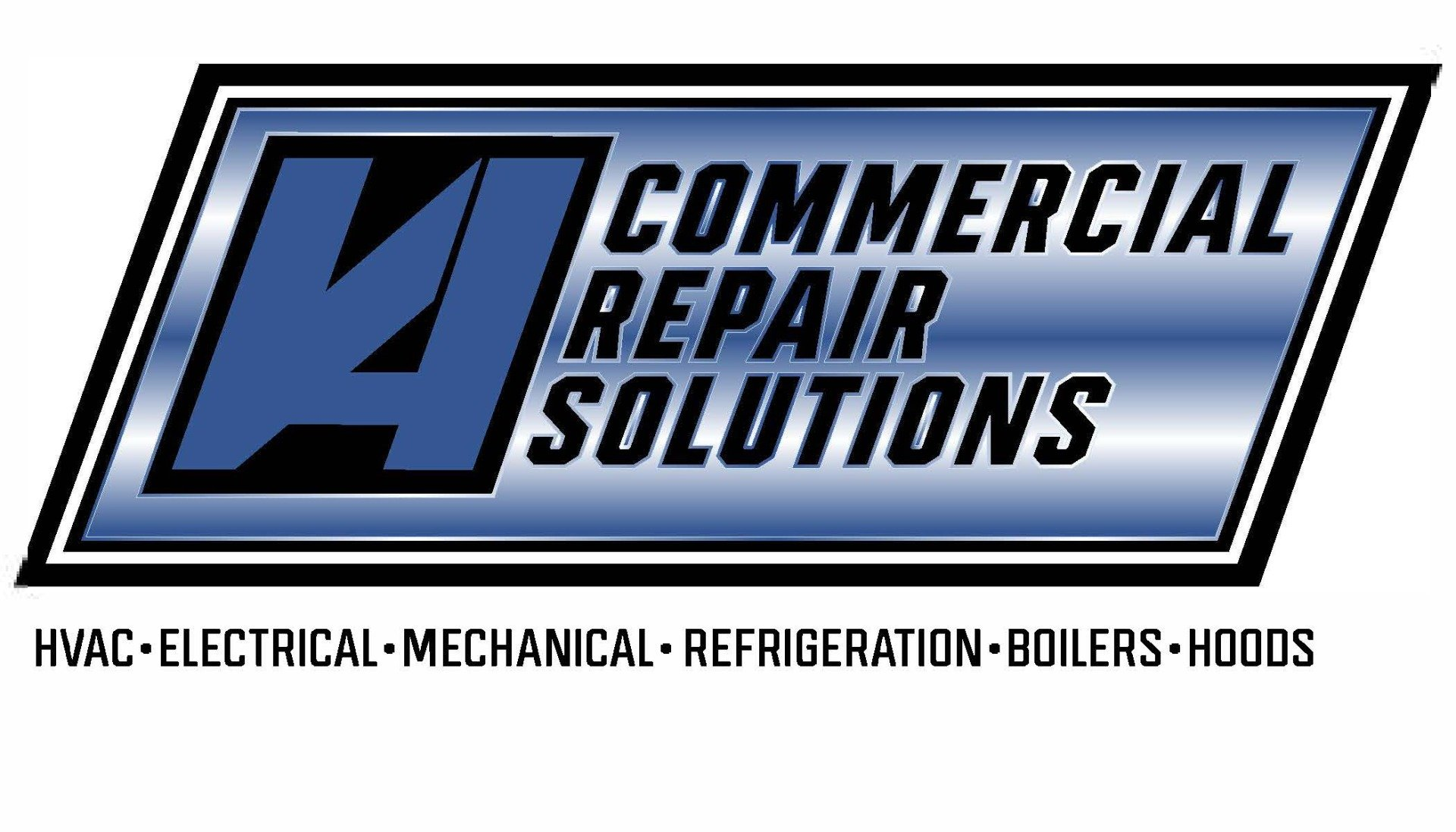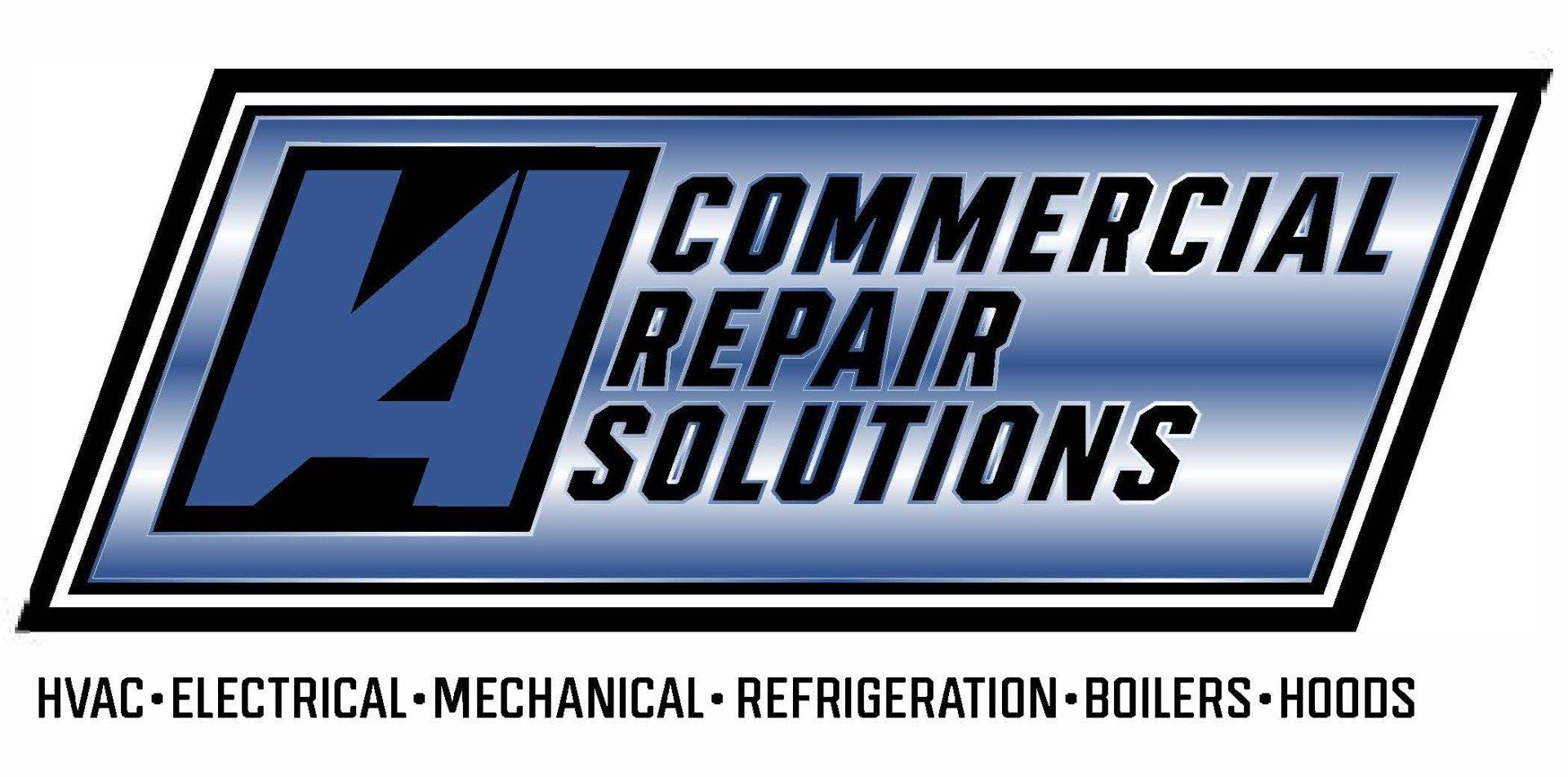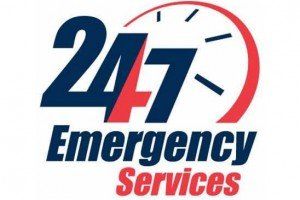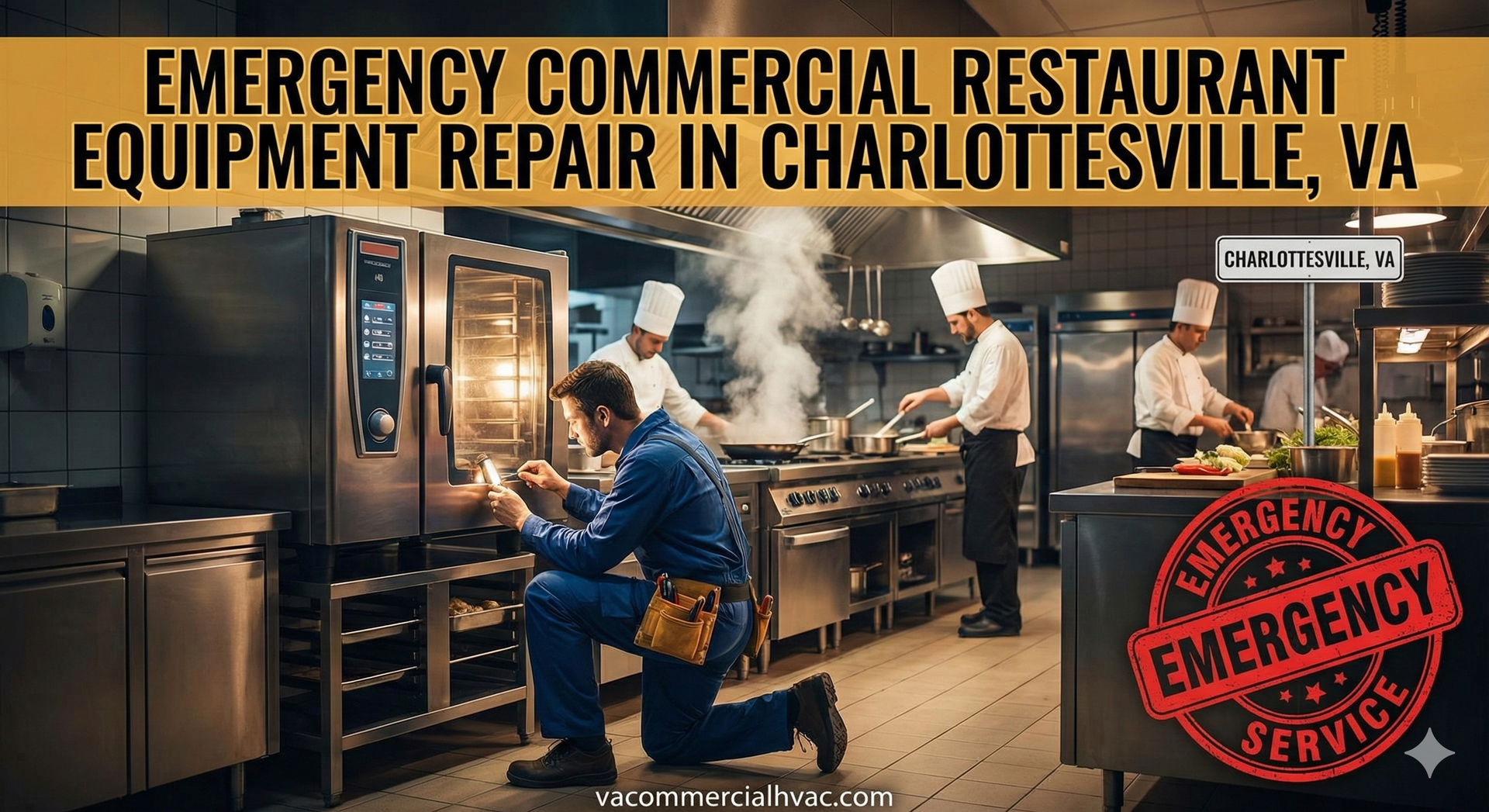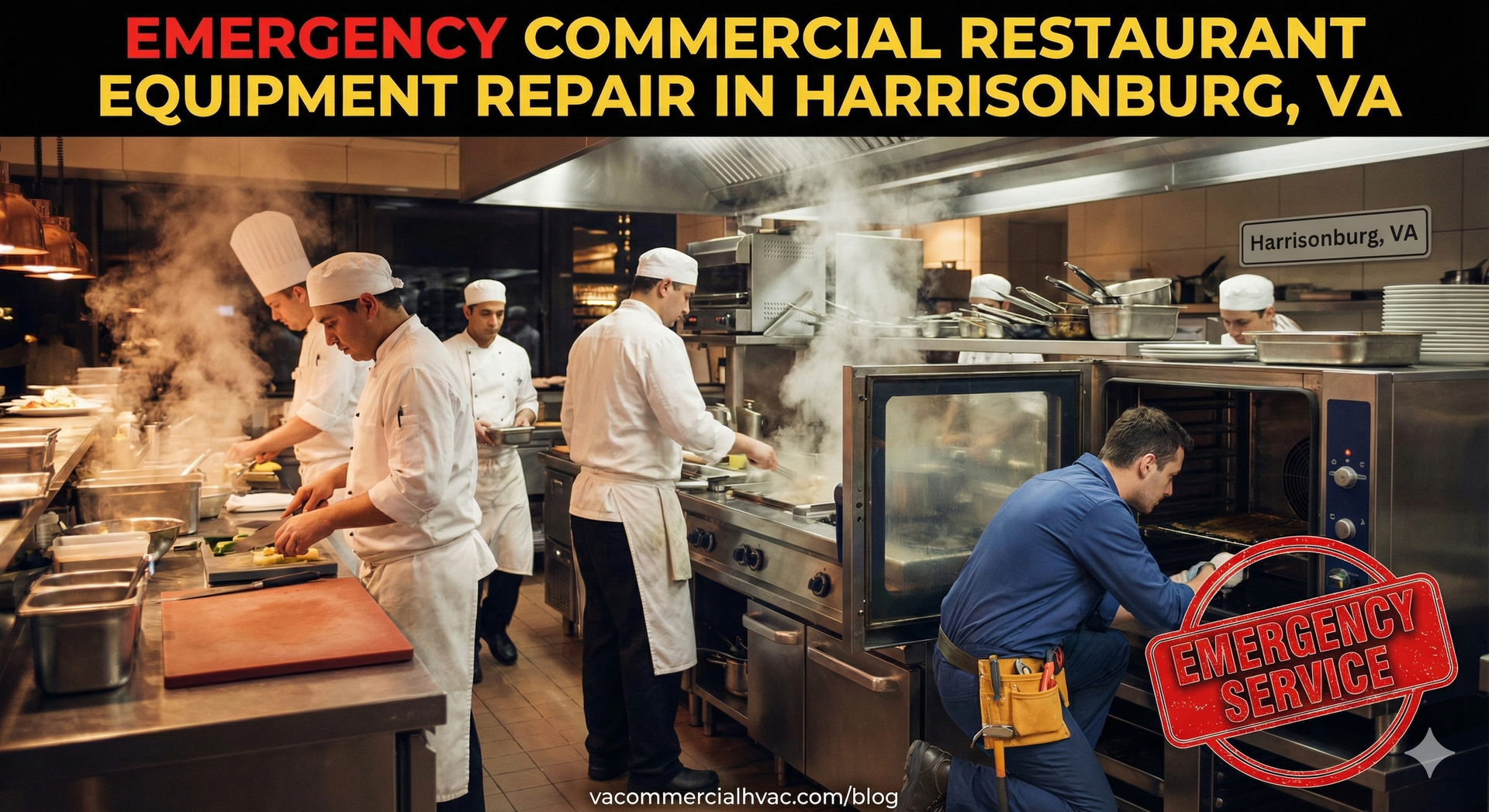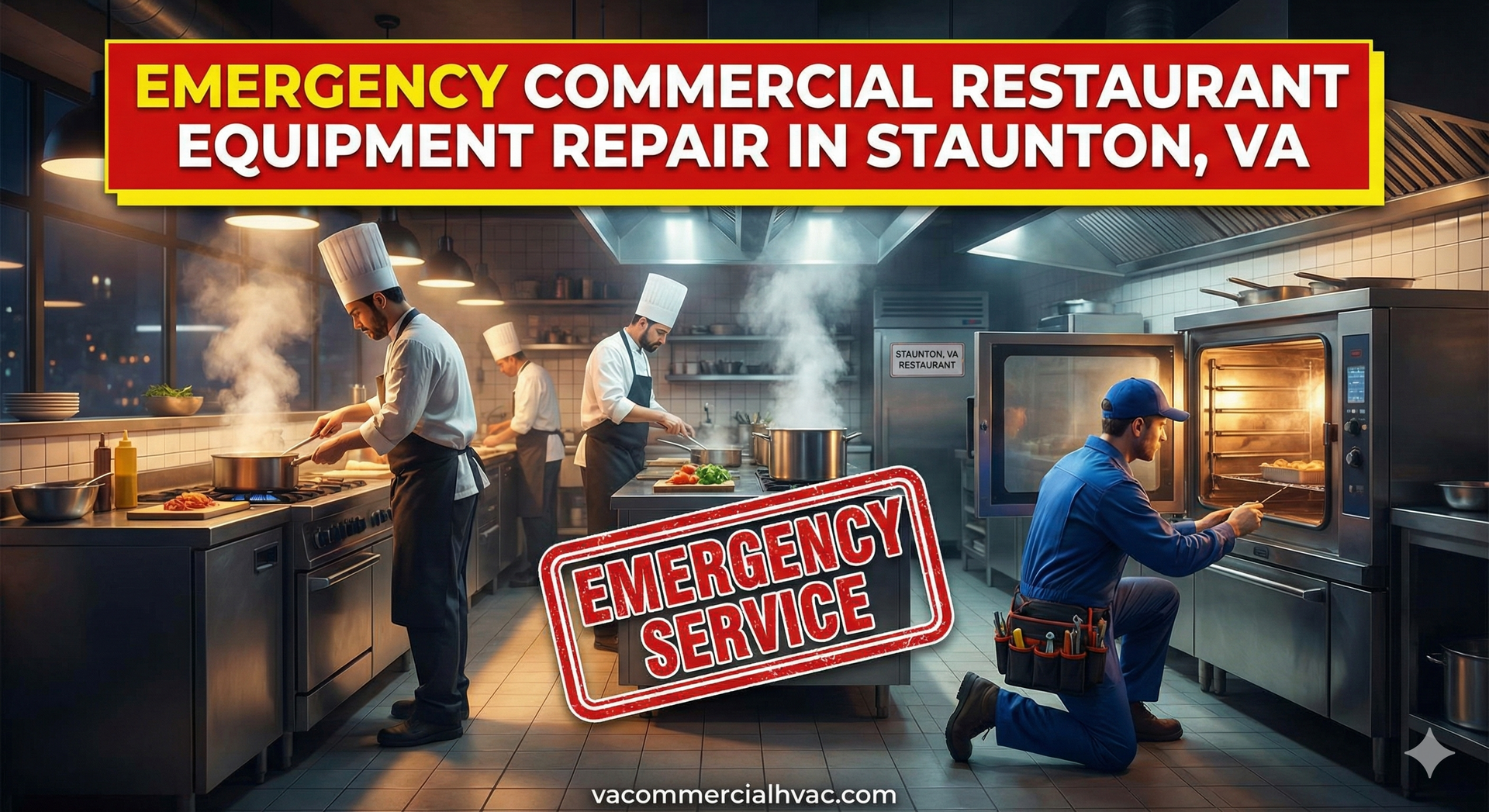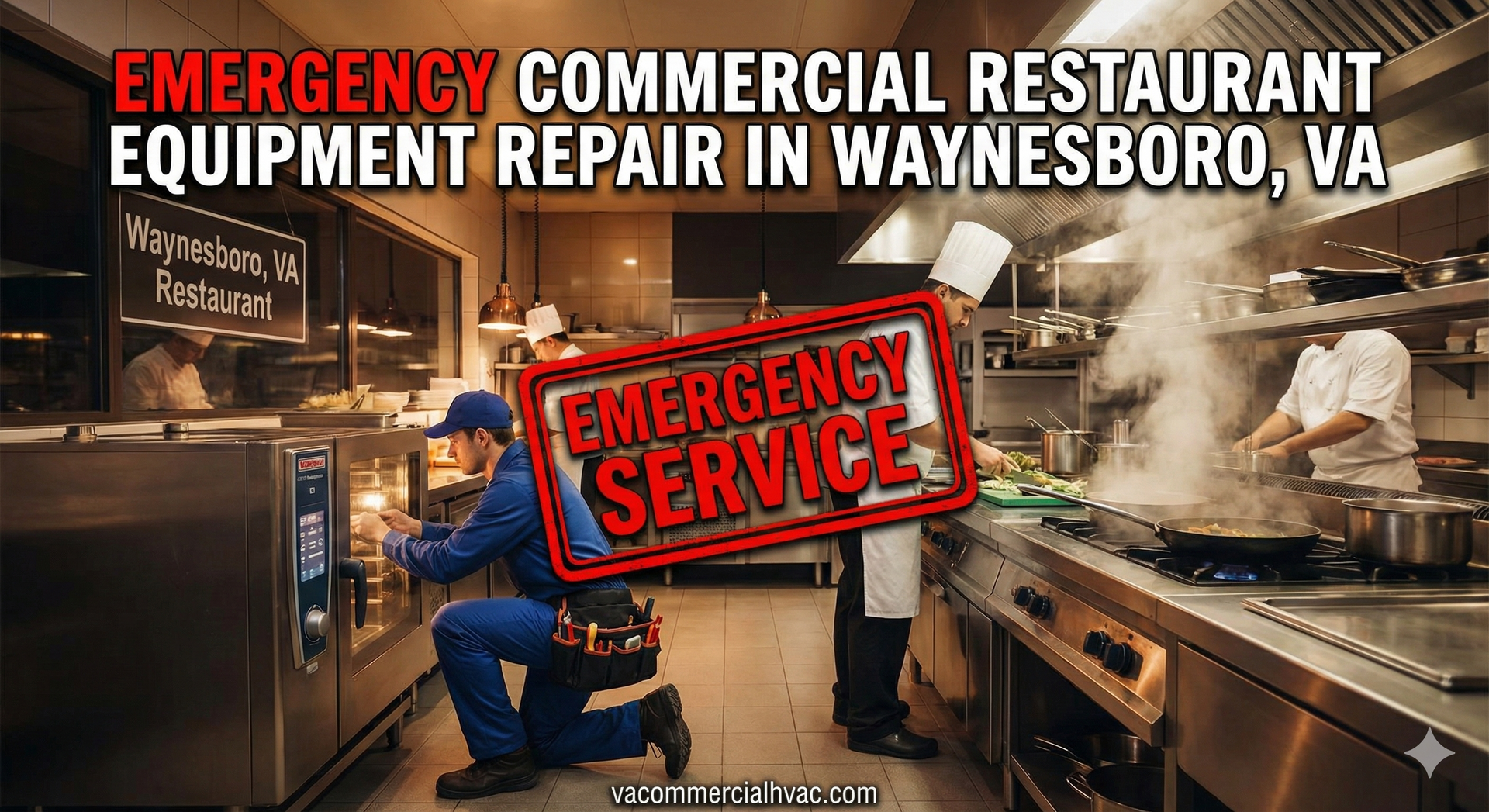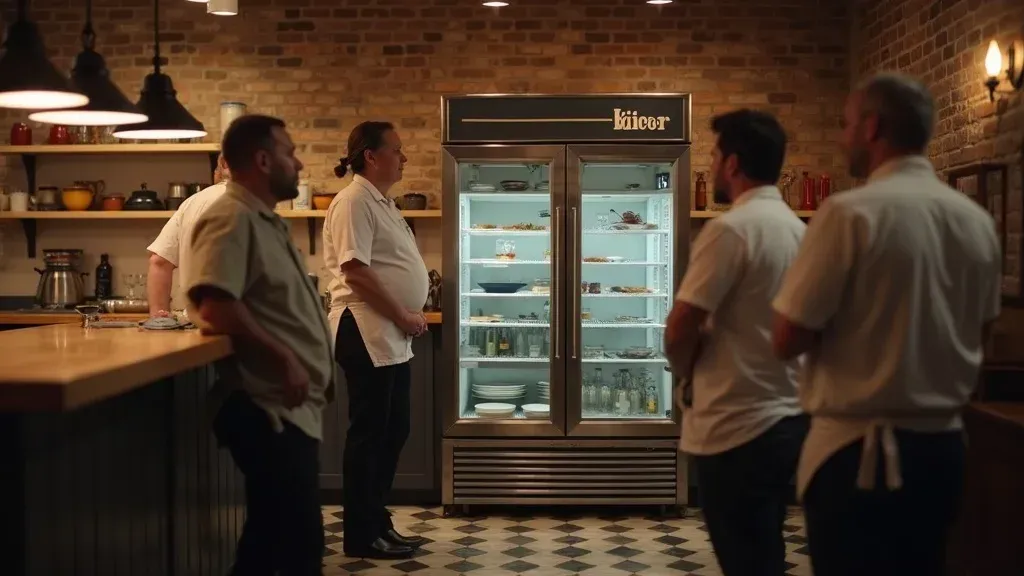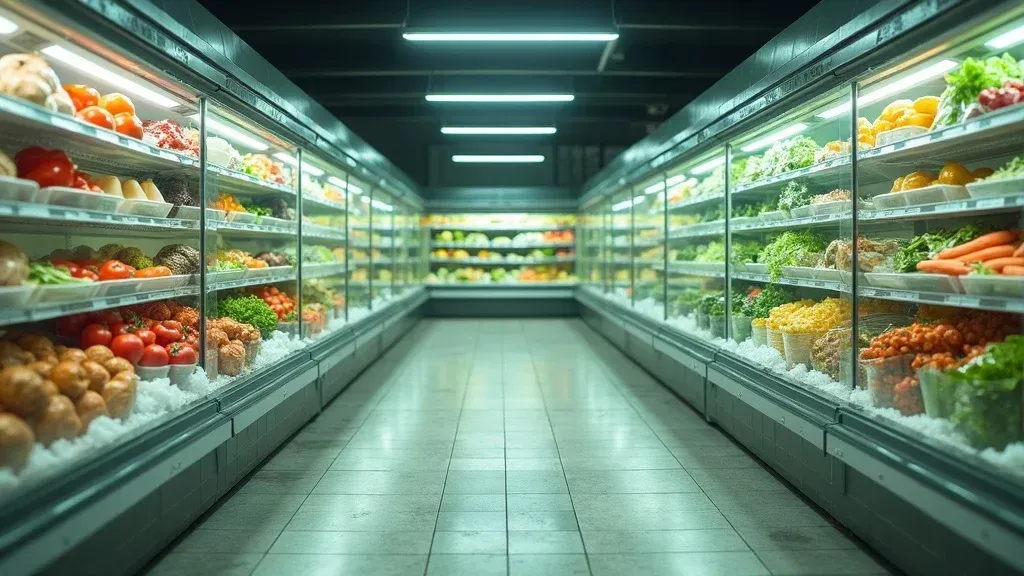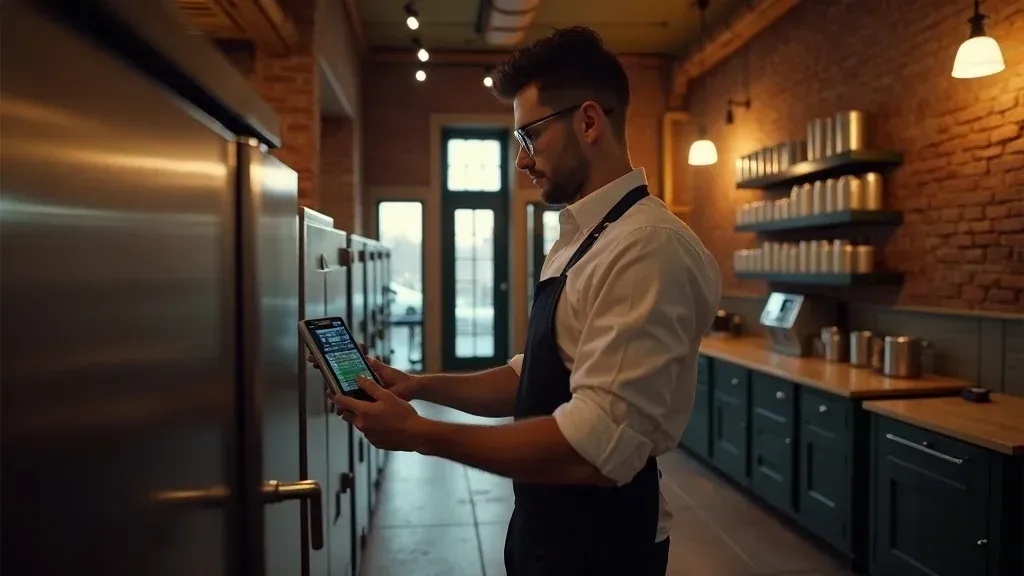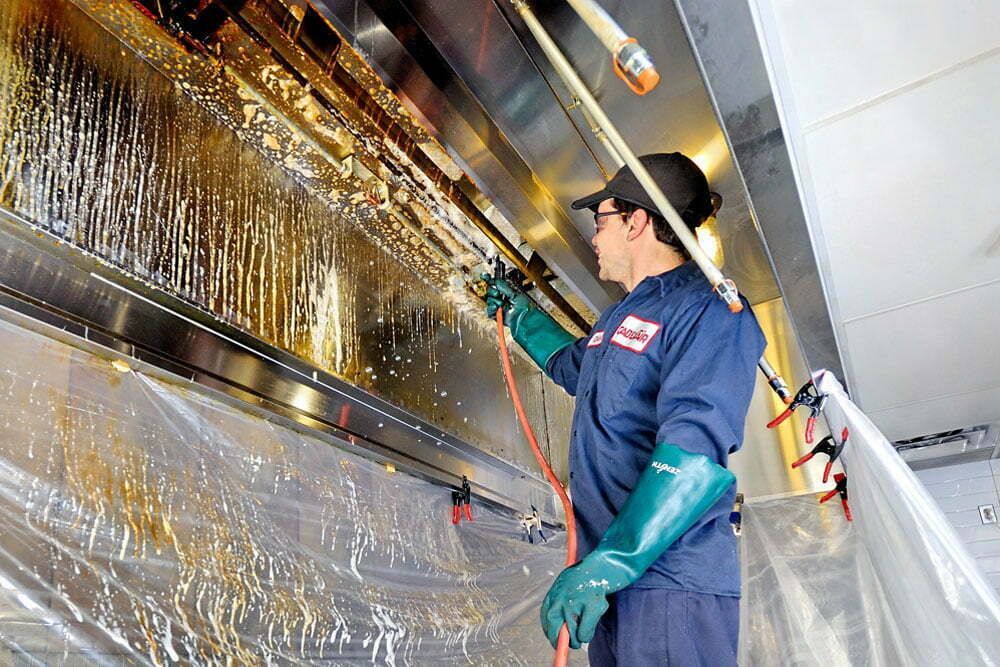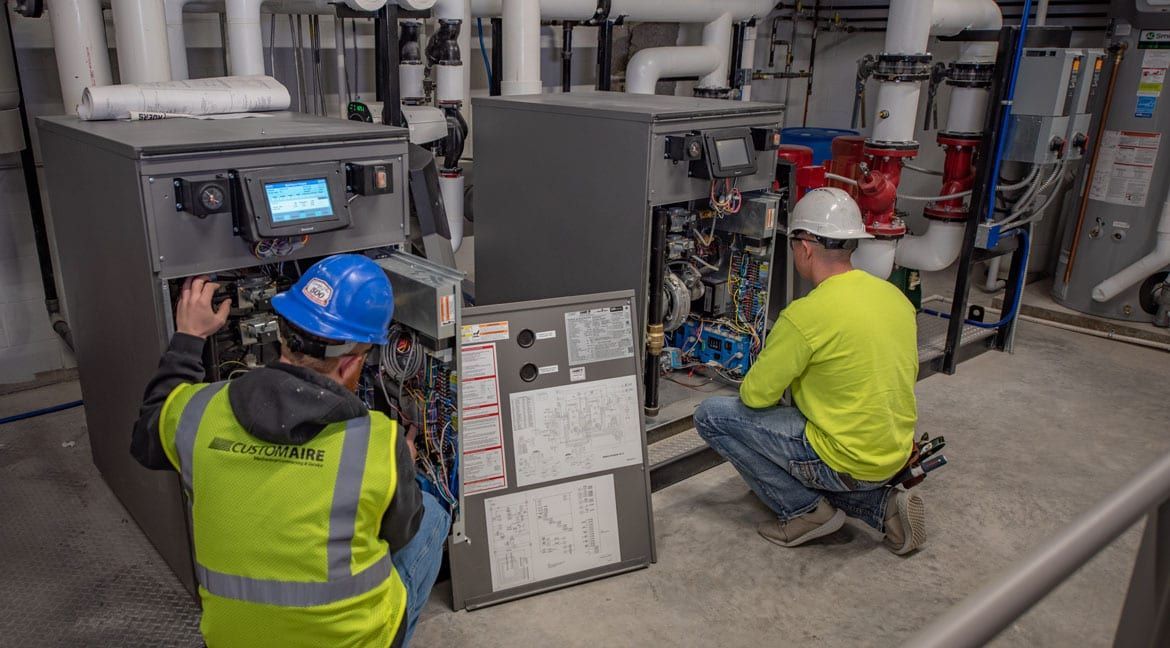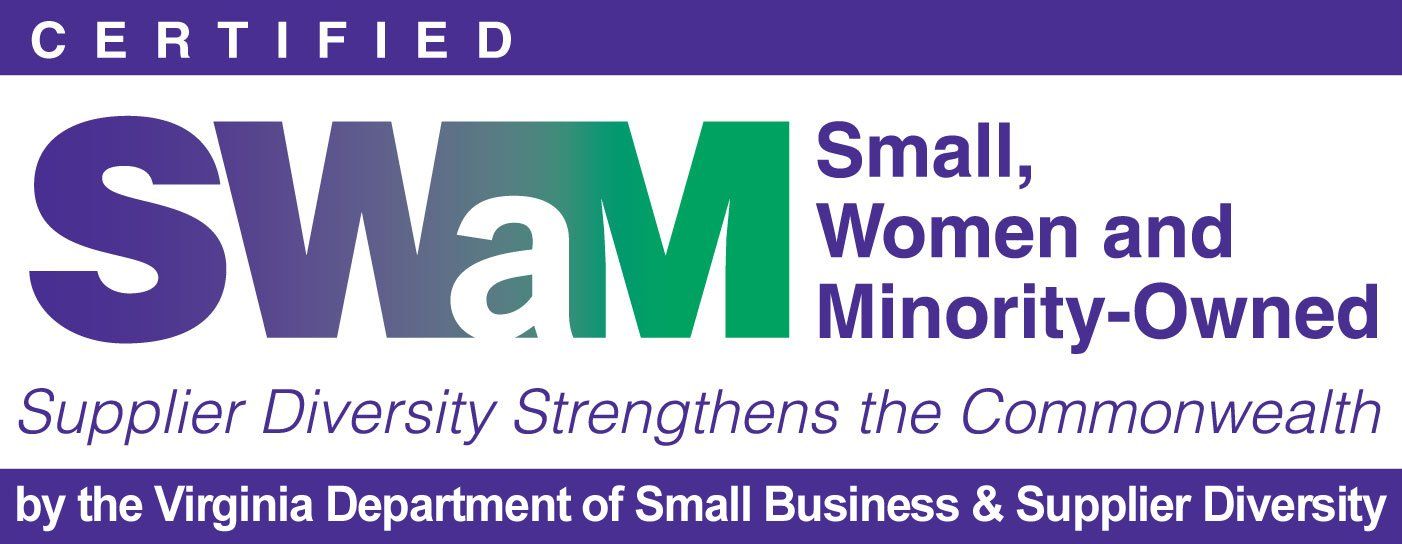Charlottesville Commercial Ice Maker Repair, Maintenance & Service Guide
Fast, Reliable Service from Commercial Refrigeration Specialists - VA Commercial Repair Solutions
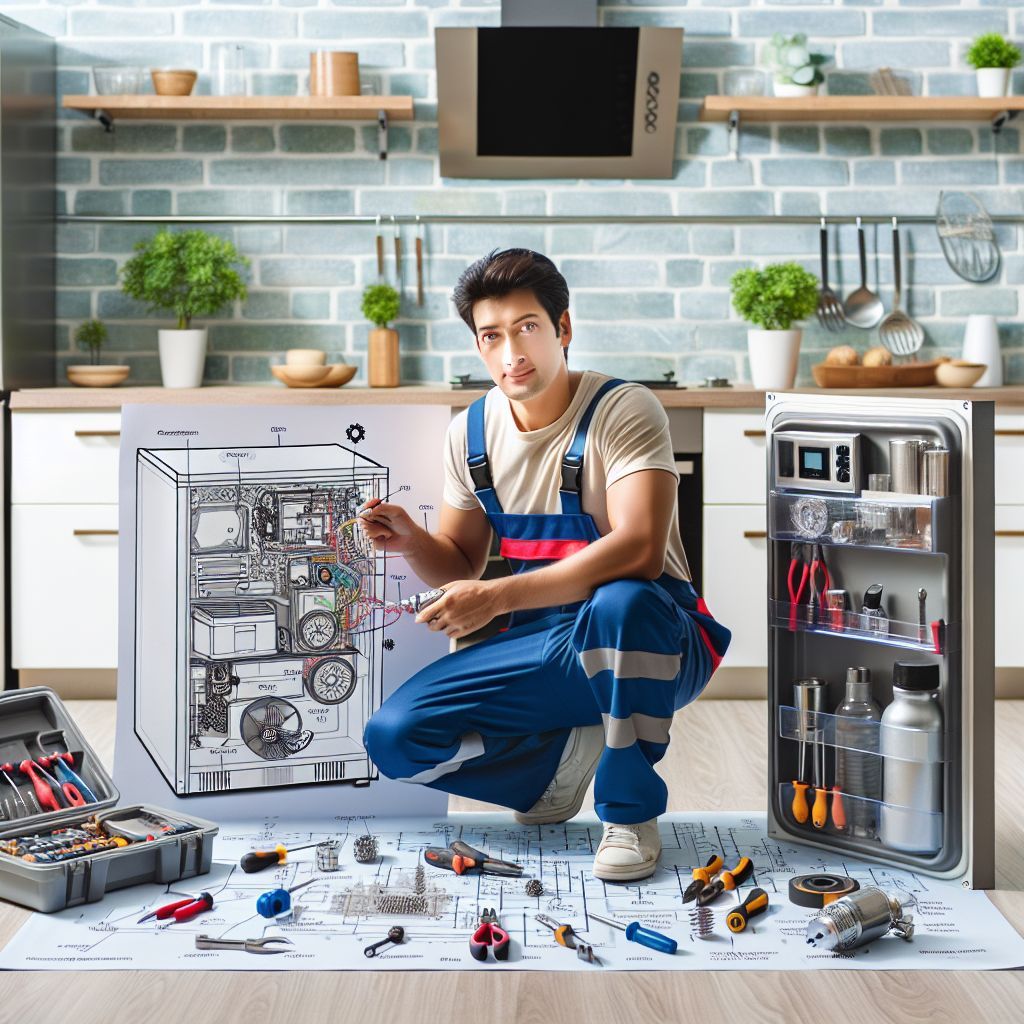
Article-At-A-Glance
- Commercial ice makers in Charlottesville face unique challenges due to the region's hard water and humidity, requiring specialized maintenance to avoid costly breakdowns
- Warning signs like slow ice production, strange noises, and water leaks can indicate issues that need immediate professional attention
- Regular maintenance can extend your ice maker's lifespan by 3-5 years while ensuring FDA compliance and food safety standards
- VA Commercial HVAC offers specialized commercial ice maker repair services with manufacturer-certified technicians and emergency response capabilities
- A proper maintenance schedule combines daily staff cleaning routines with professional quarterly service to maximize equipment performance
When your commercial ice maker breaks down in the middle of a busy service, it's more than an inconvenience—it's potentially thousands in lost revenue. Charlottesville businesses face unique challenges with their ice equipment due to the region's specific water quality and climate conditions. VA Commercial HVAC provides specialized ice maker repair services with technicians who understand these local factors and can quickly diagnose and resolve issues before they impact your bottom line.
Commercial ice machines are complex systems with multiple components that can fail under Virginia's demanding conditions. From restaurants and hotels to healthcare facilities and convenience stores, reliable ice production is critical to daily operations. This comprehensive guide covers everything Charlottesville business owners need to know about keeping their ice makers running efficiently year-round.
Why Your Commercial Ice Maker Stops Working (And What It Costs You)
A failed ice maker does more than just inconvenience your staff—it directly impacts your profitability. The average restaurant loses $500-$1,000 in revenue for every day without sufficient ice production. Beyond immediate revenue loss, you face potential food spoilage, customer dissatisfaction, and even health code violations when your ice system fails unexpectedly.
Most commercial ice machines failures in Charlottesville stem from preventable issues. Virginia's hard water creates mineral buildup that obstructs water flow and damages critical components. The region's high humidity levels in summer months put extra strain on condensers and evaporators. Seasonal temperature fluctuations can trigger pressure imbalances in refrigeration systems. Understanding these regional factors is crucial for proper maintenance and timely repairs.
The financial impact of ice maker downtime extends beyond repair costs. Emergency service calls typically cost 1.5-2 times more than scheduled maintenance visits. Meanwhile, your staff scrambles to source ice from elsewhere, diverting them from their normal duties and potentially compromising food safety protocols. The ripple effects can impact your entire operation for days.
5 Warning Signs Your Ice Machine Needs Immediate Attention
Commercial ice machines typically give clear signals before complete failure. Recognizing these warning signs can help you address issues before they escalate into emergencies. Most importantly, acting on these indicators can prevent food safety risks and costly business interruptions.
Professional technicians report that most catastrophic ice maker failures showed symptoms 1-2 weeks before breakdown. Learning to recognize these warning signs can save Charlottesville businesses thousands in emergency repair costs and lost revenue. Here are the critical indicators that your ice machine needs professional attention:
- Diminished ice production or complete stoppage
- Unusual noises during operation (grinding, knocking, hissing)
- Water leakage around or beneath the unit
- Changes in ice quality, size, or clarity
- Unusual odors or taste in produced ice
1. Ice Production Has Slowed or Stopped
When your machine's ice output decreases, it signals an underlying issue requiring attention. Healthy commercial ice makers maintain consistent production rates within their design specifications. A unit that previously produced 500 pounds daily but now struggles to make 300 pounds indicates a developing problem. Common causes include scale buildup on evaporator plates, refrigerant pressure issues, or water supply restrictions.
Charlottesville's water quality often contributes to production slowdowns through mineral accumulation on critical components. The calcium and magnesium present in Virginia's water supply can reduce efficiency by up to 30% before complete failure occurs. Regular professional descaling can restore full production capacity and prevent permanent damage to expensive components.
Complete ice production stoppage represents an emergency situation requiring immediate professional intervention. This condition can result from compressor failure, refrigerant leaks, or electrical control issues. Attempting DIY repairs on non-functioning ice makers typically leads to more expensive repairs and potential safety hazards.
2. Strange Noises Coming From the Unit
Ice Maker Noise Troubleshooting Guide
Grinding: Often indicates failing bearings in the water pump or auger motor
Rattling: Loose components or debris in the ice-making mechanism
Hissing/Bubbling: Potential refrigerant leak requiring immediate attention
Clicking: Electrical components cycling on/off repeatedly, suggesting control issues
Banging: Water hammer effect or compressor problems
Commercial ice makers should operate with minimal noise beyond the expected hum of the compressor and occasional water movement sounds. New or intensifying sounds during operation almost always indicate a developing mechanical problem. Addressing these noises promptly can prevent more costly repairs and extend equipment lifespan.
Grinding or scraping noises specifically warrant immediate attention as they typically indicate metal-on-metal contact that can cause catastrophic damage. These sounds often stem from bearing failures in motors or augers, issues that can be repaired relatively inexpensively if caught early. Ignoring these warning signs frequently results in complete motor replacement costing 5-10 times more than preventative repairs.
3. Water Leaks Around the Machine
Water leakage from a commercial ice maker indicates several possible issues ranging from simple to serious. Minor leaks often stem from loose fittings, worn gaskets, or improperly aligned components. More concerning leaks can signal failures in the water distribution system, clogged drain lines, or damage to the water reservoir. Addressing water leaks promptly prevents water damage to your facility and potential mold growth that could create health code violations.
4. Ice Quality Problems
Changes in ice appearance, size, or consistency provide valuable diagnostic information. Cloudy ice typically indicates mineral concentration or air trapped in the freezing process. Incomplete or malformed ice cubes suggest problems with water distribution or freezing cycles. Small or hollow cubes often result from scale buildup restricting water flow. These quality issues not only affect customer satisfaction but also signal developing mechanical problems that will worsen without intervention.
5. Unusual Odors or Taste in Ice
Ice should be odorless and tasteless. When customers or staff notice unpleasant smells or flavors in your ice, it indicates contamination within the machine. Bacterial growth, mold development, or chemical residues from improper cleaning can all create these sensory issues. Beyond the obvious customer satisfaction concerns, these conditions represent potential health code violations that require immediate professional cleaning and sanitization.
Common Ice Maker Problems in Charlottesville Businesses
Charlottesville businesses face several region-specific challenges with their commercial ice makers. Our humid summers and significant seasonal temperature variations put extra stress on refrigeration systems, while the area's water quality presents its own set of issues. Understanding these common problems helps you prevent them through proper maintenance and recognize when professional intervention is necessary.
Local service data shows that over 70% of commercial ice maker failures in central Virginia stem from just three primary issues. Addressing these common problems proactively can dramatically reduce your risk of unexpected downtime and extend your equipment's useful life by years.
Hard Water Scale Buildup
Charlottesville's water supply contains moderate to high levels of dissolved minerals that create stubborn scale deposits on critical ice maker components. This scale buildup restricts water flow, insulates heat transfer surfaces, and can completely disable moving parts. The evaporator plates, water inlet valves, and distribution tubes are particularly vulnerable to this accumulation. Without regular descaling, your machine's efficiency can drop by 25% within six months of operation.
Professional descaling treatments use food-safe chemicals specifically formulated to dissolve mineral deposits without damaging sensitive components. While consumer-grade vinegar solutions may temporarily improve conditions, they cannot match the effectiveness of commercial-grade descaling agents applied by trained technicians. Professional descaling typically costs $150-250 but can prevent thousands in repair costs and lost business.
Refrigerant Leaks
Commercial ice makers depend on a precisely controlled refrigeration cycle that requires the exact amount of refrigerant specified by the manufacturer. Even minor leaks from vibration-loosened fittings or corroded components can reduce efficiency by 30-50% before being obvious to operators. These leaks not only reduce production capacity but also force the compressor to work harder, potentially causing premature failure of this expensive component.
Virginia's seasonal temperature fluctuations put additional stress on refrigeration systems through expansion and contraction cycles. Commercial HVAC technicians use specialized electronic leak detection equipment that can identify refrigerant escape points invisible to the naked eye. Early detection and repair of these leaks can prevent compressor damage that typically costs $800-1,500 to fix.
Condenser Issues Due to Virginia's Humidity
Charlottesville's humid climate creates unique challenges for air-cooled ice makers. Condensers must work harder to reject heat in humid conditions, leading to increased power consumption and reduced ice production. Dust and airborne debris combine with moisture to create stubborn buildup on condenser coils that insulates them from airflow. This buildup can raise head pressure to dangerous levels, triggering automatic shutdowns or causing compressor damage.
Professional condenser cleaning goes beyond simple brushing to include specialized cleaning solutions that dissolve organic materials and restore optimal heat transfer. This service typically costs $100-150 when performed as part of regular maintenance but can prevent repairs costing 5-10 times that amount. Air-cooled machines in Charlottesville generally require condenser cleaning every 3-4 months due to our unique climate conditions.
DIY Ice Maker Maintenance Checklist
While professional service is essential for commercial ice makers, your staff can perform several important maintenance tasks between service visits. These routine procedures help maintain efficiency, extend equipment life, and ensure food safety compliance. Implementing a structured maintenance program demonstrates your commitment to quality and can prevent many common ice maker problems.
Daily Cleaning Tasks
Daily maintenance takes just minutes but significantly impacts ice quality and machine longevity. Staff should wipe exterior surfaces with food-safe sanitizer, especially high-touch areas like handles and control panels. The ice scoop should be sanitized multiple times daily according to food safety protocols. Ice storage bins should be inspected for any foreign objects or signs of contamination. These simple habits prevent biofilm development that can create odors and impact ice quality.
The ice machine's air intake vents should be checked daily for blockages from cardboard boxes, cleaning supplies, or other items that might restrict airflow. Many Charlottesville businesses inadvertently reduce their ice production by placing items too close to these critical ventilation points. Maintaining a minimum 12-inch clearance around air-cooled machines ensures proper heat rejection and prevents unnecessary strain on the compressor.
Weekly Inspection Points
- Check water filters for pressure drops indicating clogging (if equipped with pressure gauges)
- Inspect drain lines for proper flow and absence of mold growth
- Monitor ice quality for changes in clarity, size, or shape
- Check production rate against baseline expectations
- Listen for unusual noises during different phases of the production cycle
- Examine ice storage bin door gaskets for damage or improper sealing
Weekly inspections help identify developing issues before they escalate into failures. Establishing baseline performance metrics for your specific machine model allows for meaningful comparisons. Many Charlottesville businesses maintain a simple log where staff record these observations, creating valuable historical data that helps technicians diagnose intermittent problems that might not be present during service visits.
Monthly Maintenance Steps
More thorough cleaning and inspection should be performed monthly to address issues beyond daily and weekly maintenance. Water filtration systems should be checked for replacement needs, typically indicated by pressure differential gauges or based on manufacturer recommendations. Air filters on air-cooled machines should be removed and cleaned or replaced. Exterior condenser coils should be visually inspected for dust accumulation and cleaned if necessary using a soft brush and vacuum. Ice thickness sensors should be wiped with a clean, dry cloth to ensure accurate readings.
For businesses without service agreements, monthly inspections provide an opportunity to schedule professional maintenance before small issues become major problems. Seasonal transitions in Charlottesville's climate create particular stress on ice machines, making spring and fall ideal times for comprehensive professional service. The $200-300 investment in preventative maintenance typically saves thousands in emergency repair costs and business disruption.
Professional Maintenance Services That Save You Money
While staff maintenance is important, commercial ice makers require regular professional service to operate reliably. Factory-trained technicians have specialized tools, knowledge, and access to OEM parts that ensure your equipment remains in optimal condition.
Professional maintenance not only prevents costly breakdowns but also optimizes energy efficiency, reducing utility costs by 10-15% compared to poorly maintained machines.
Professional ice maker maintenance includes comprehensive services beyond the capabilities of most staff. Technicians calibrate water level sensors, test refrigerant pressures, measure amperage draw, and perform dozens of other technical checks to identify potential issues before they cause failures. The small investment in regular maintenance typically pays for itself through extended equipment life and improved operational efficiency. Learn more about the commercial ice machine market in Charlottesville and how it can affect your business operations.
FDA-Compliant Cleaning Protocols
Commercial ice is classified as food by the FDA, requiring adherence to strict sanitation standards. Professional service providers like VA Commercial HVAC implement cleaning protocols that meet or exceed these standards, protecting your customers and your business reputation. These protocols address biofilm and scale that develop in water distribution systems and on ice-making surfaces, issues that basic cleaning cannot adequately resolve.
Professional sanitization includes disassembly of the water distribution system, application of specialized cleaning solutions, and thorough sanitization of all food-contact surfaces. Technicians use food-safe chemicals at precise concentrations and contact times to eliminate microbial contamination without leaving harmful residues. This thorough process typically requires 2-3 hours and should be performed quarterly for most Charlottesville businesses.
Beyond immediate food safety benefits, professional cleaning extends equipment life by preventing scale-related damage to components. The evaporator plates, water pumps, and sensors last significantly longer when kept free of mineral buildup. Most manufacturers require documentation of professional cleaning to maintain warranty coverage, making these services essential for protecting your equipment investment.
Component Inspection Quarterly Identifies wear before failure occurs Health department inspections in Charlottesville specifically examine ice machine cleanliness and maintenance records. Violations can result in fines, mandatory closing until issues are resolved, and damage to your business reputation. Professional cleaning services provide detailed documentation that demonstrates your compliance with all applicable regulations, protecting you during these inspections.
Water Filtration System Maintenance
Proper water filtration is especially critical in Charlottesville, where mineral content can significantly impact ice maker performance. Professional maintenance includes inspection and servicing of filtration systems to ensure optimal water quality entering your machine. Technicians measure water hardness levels, test for chlorine and other contaminants, and verify filter effectiveness during each service visit. This specialized attention to water quality can extend component life by 30-50% compared to unfiltered systems.
Water filter cartridges typically require replacement every 3-6 months depending on local water conditions and usage volume. Professional technicians track filter life and schedule replacements before performance degrades, preventing unexpected production issues. Many Charlottesville businesses waste thousands annually on premature component failures simply because they neglect timely filter replacements that would have cost a fraction of the repair expense.
Component Testing and Optimization
Professional maintenance includes comprehensive testing of all electrical and mechanical components to identify wear before failure occurs. Technicians measure voltage at critical points, test amperage draw under load, and verify proper operation of safety controls. They also measure refrigerant pressures, superheat values, and subcooling to ensure the refrigeration system operates within manufacturer specifications. These detailed evaluations detect developing problems invisible to untrained observers.
Optimization adjustments during maintenance visits can significantly improve energy efficiency and production capacity. Technicians calibrate water level controls, adjust ice thickness sensors, and fine-tune refrigeration settings to match your specific operating environment. These adjustments typically improve energy efficiency by 10-15% while ensuring maximum production capacity, directly improving your bottom line through reduced utility costs and greater ice availability.
Service Agreement Benefits
Comprehensive service agreements provide Charlottesville businesses with predictable maintenance costs and priority emergency response. These agreements typically include quarterly professional cleaning, biannual descaling treatments, and all routine adjustments necessary for optimal performance. Service agreement customers receive preferential scheduling for emergency repairs, minimizing expensive downtime during critical business hours. The predictable expense of these agreements helps with budgeting while typically reducing total ownership costs by 15-20% compared to reactive maintenance approaches.
When to Call for Emergency Ice Maker Repair
While routine maintenance prevents many problems, certain situations require immediate professional intervention. Complete production stoppage, significant water leakage, unusual burning odors, or grinding noises indicate potentially serious issues that require emergency repair services. These conditions can worsen quickly if not addressed, potentially causing extensive damage to expensive components or creating safety hazards.
VA Commercial HVAC offers emergency ice maker repair services throughout the Charlottesville area with rapid response times even during weekends and holidays. Their technicians carry comprehensive parts inventories for major brands including Manitowoc, Hoshizaki, Ice-O-Matic, and Scotsman, enabling most repairs to be completed during the initial service call. This immediate resolution capability minimizes downtime during critical business hours, protecting your revenue and customer satisfaction.
Many emergency service calls could have been prevented through regular maintenance. Data from Charlottesville service providers indicates that over 80% of emergency ice maker repairs address issues that would have been detected and resolved during routine professional maintenance. The premium costs of emergency service—typically 50-100% higher than standard service rates—make preventative maintenance the clearly superior financial choice.
Top Brands and Their Specific Repair Needs
Different ice maker brands present unique maintenance requirements and common failure points. Understanding these brand-specific characteristics helps you make informed decisions about equipment selection and maintenance scheduling. VA Commercial HVAC technicians receive specialized factory training on all major commercial ice maker brands, ensuring they understand the nuances of each manufacturer's designs.
Manitowoc Repair Solutions
Manitowoc ice machines are known for reliability but require particular attention to their self-cleaning systems and electronic controls. Their EasyClean technology simplifies some maintenance aspects but doesn't eliminate the need for professional descaling and sanitization. These units commonly develop issues with the water level probe, bin thermostat, and electronic control board that require specialized diagnostic equipment to resolve properly. Manitowoc machines in Charlottesville typically require water distribution system inspection every 3 months due to the region's water hardness.
Hoshizaki Troubleshooting Guide
Hoshizaki's distinctive "crescent cube" design creates exceptional ice quality but requires particular attention to the water circuit and pump systems. These machines typically develop scale accumulation on the evaporator cylinder that requires specialized cleaning procedures and solutions. The water pump, float valve, and control board represent the most common failure points in Charlottesville installations. Hoshizaki units benefit from more frequent filter changes than other brands due to their sensitive water distribution systems.
Ice-O-Matic Common Issues
Ice-O-Matic machines offer excellent value but require consistent maintenance to deliver reliable performance. Their water distribution systems are particularly sensitive to mineral buildup common in Charlottesville water supplies. The harvest assist motors, water inlet valves, and float switches represent common failure points that professional technicians can often identify before complete failure occurs. These machines typically require thorough descaling every 4-6 months in the Charlottesville region to maintain optimal production capacity.
Scotsman Service Tips
Scotsman ice machines feature innovative designs that require specific maintenance procedures to maintain reliability. Their water distribution systems and evaporator plates need regular inspection for scale accumulation that can significantly impact production efficiency. Common issues include water sensor failures, harvest valve problems, and control board malfunctions that require specialized diagnostic approaches. Scotsman's self-contained units need particular attention to condenser cleanliness due to limited airflow design in some models. Commercial ice machines are essential workhorses for Charlottesville businesses, from the bustling restaurant scene to healthcare facilities.
How to Choose a Reliable Ice Machine Repair Service in Charlottesville
Selecting the right service provider significantly impacts your ice maker's reliability and longevity. Not all repair services offer the same expertise, response capabilities, or value. Asking the right questions during your selection process helps identify providers capable of delivering dependable service that protects your equipment investment and business operations. Look for companies with specialized commercial refrigeration expertise rather than general appliance repair services.
Certification Requirements
Legitimate commercial ice maker repair technicians must hold EPA Section 608 certification for handling refrigerants. This federal requirement ensures technicians understand proper refrigerant handling procedures that protect both equipment and the environment. Beyond this baseline certification, look for technicians with manufacturer-specific training certifications from major brands. These factory certifications indicate the technician has completed specialized training programs and demonstrated proficiency with specific equipment designs.
VA Commercial HVAC employs only technicians with comprehensive certification credentials, including EPA certification and manufacturer-specific training from Manitowoc, Hoshizaki, and other major brands. This certification focus ensures their technicians understand the nuances of each system design and can implement factory-recommended repair procedures that maintain warranty coverage. Their ongoing training program keeps technicians current with evolving technology and manufacturer updates.
Response Time Expectations
When your ice maker fails, rapid response can prevent significant business disruption. Reputable service providers establish clear expectations for both routine and emergency response times. The best Charlottesville providers maintain response capabilities of 2-4 hours for emergency situations and same-day or next-day service for non-emergency calls. Ask potential providers about their guaranteed response windows and after-hours capabilities before you need emergency service.
Geographic coverage areas significantly impact response capabilities. Some national chains advertise service in Charlottesville but dispatch technicians from Richmond or other distant locations, creating inevitable delays during critical failures. Local providers with Charlottesville-based technicians typically deliver faster response times, especially during peak summer months when ice maker failures increase dramatically throughout the region.
Parts Availability Questions
Component availability directly impacts repair timeframes and business disruption during failures. Professional service providers maintain comprehensive parts inventories for common ice maker brands, enabling most repairs to be completed during the initial service call. Ask potential providers about their parts stocking practices, particularly for your specific equipment brand and model. The best providers stock 85-90% of commonly needed components rather than ordering parts after diagnosis, which can extend downtime by days or even weeks.
OEM (Original Equipment Manufacturer) parts availability represents a particularly important consideration. While some repair services use generic replacement components to reduce costs, these substitutions often deliver shorter service life and may invalidate manufacturer warranties. Reputable providers like VA Commercial HVAC maintain relationships with authorized parts distributors and use only genuine OEM components that ensure optimal performance and reliability.
Warranty Considerations
Quality repair services stand behind their work with meaningful warranty coverage on both parts and labor. Standard industry practice includes 90-day labor warranties and parts coverage matching manufacturer warranty terms (typically 1 year). Providers offering shorter warranty periods or excluding certain components from coverage may indicate less confidence in their repair quality. Ask specifically about warranty terms and documentation procedures before selecting a service provider.
Manufacturer warranty preservation represents another critical consideration when selecting service providers. Most ice maker warranties require documentation of professional maintenance and the use of factory-authorized repair procedures. Using unqualified technicians or unauthorized repair methods can void remaining factory warranty coverage, potentially costing thousands in otherwise covered repairs. Reputable providers maintain detailed service records that protect your warranty coverage and document compliance with manufacturer requirements.
Cost Structure Transparency
Reputable service providers offer clear, upfront pricing structures without hidden fees or unclear terms. Look for companies that provide detailed written estimates before proceeding with repairs and explain all charges clearly. The best providers offer flat-rate pricing for common repairs rather than open-ended hourly billing that creates unpredictable costs. This transparency allows for informed decision-making and eliminates unpleasant surprises when the invoice arrives.
Commercial Ice Maker Repair Costs in Charlottesville
Understanding typical repair costs helps you budget appropriately and evaluate service quotes effectively. Commercial ice maker repair expenses vary based on the specific issue, equipment type, and service provider's pricing structure. While cost shouldn't be the only consideration when selecting service providers, awareness of reasonable price ranges helps you avoid both overpriced services and suspiciously inexpensive options that may indicate corner-cutting practices.
Labor typically represents 40-60% of total repair costs, with the remainder covering parts and consumable materials. Most legitimate Charlottesville service providers charge $85-125 per hour for commercial refrigeration technicians, reflecting the specialized training and equipment required for this work. Material markups typically range from 20-35% over wholesale cost, covering inventory expenses and procurement services. These components combine to create the total repair investment required to restore equipment functionality.
Standard Service Call Pricing
Diagnostic service calls typically cost $95-150 in the Charlottesville area, including the first 30-60 minutes of diagnostic time. This initial fee covers travel expenses, basic diagnostic procedures, and assessment of repair requirements. Most providers apply this diagnostic fee toward repair costs if you proceed with their recommended services, effectively making diagnosis free when you complete the repairs with the same company.
Service call pricing often varies based on response urgency and scheduling flexibility. Some providers offer discounted rates for scheduled maintenance visits while charging premium rates for same-day emergency response. Understanding these variations helps you make cost-effective choices when possible while ensuring rapid response when truly needed. The $50-75 typical premium for emergency service often represents excellent value when compared to the cost of extended business disruption.
Common Repair Costs
Typical commercial ice maker repairs in Charlottesville range from $200-600 for most common issues, including water inlet valve replacement ($150-250), pump repairs ($200-350), or control board troubleshooting ($250-400). More substantial repairs involving the refrigeration system typically range from $500-1,200 depending on the specific components requiring attention. Complete compressor replacement represents the most expensive common repair, typically costing $1,000-1,800 including associated components and refrigerant recharging.
Emergency Service Premiums
After-hours, weekend, and holiday service typically incurs premium charges reflecting the additional costs of maintaining emergency response capabilities. Most Charlottesville providers charge 1.5-2 times their standard rates for after-hours emergency service, with higher multipliers for major holidays. While these premiums may seem substantial, they typically represent excellent value compared to the revenue loss and operational disruption caused by extended equipment downtime during critical business periods.
Some service providers offer emergency response priority programs that reduce or eliminate these premiums for participating businesses. These programs typically involve modest monthly or annual fees that guarantee rapid response without additional charges regardless of service timing. For businesses highly dependent on ice production, these programs often deliver substantial savings compared to unpredictable emergency service expenses while ensuring the fastest possible resolution when failures occur.
Extend Your Ice Maker's Life With These Pro Tips
Beyond regular maintenance, several operational practices can significantly extend your ice maker's useful life and reduce repair frequency. Proper installation represents the foundation of reliable operation, including adequate ventilation space (minimum 12 inches on all sides for air-cooled units), dedicated electrical circuits, and proper water supply configurations. Many performance issues trace back to improper installation conditions that stress components and reduce efficiency from the beginning.
Operational practices significantly impact equipment longevity. Maintaining consistent operating temperatures in the surrounding space reduces compressor strain and improves efficiency. Avoiding rapid on/off cycling by allowing complete harvest cycles before powering down prevents undue stress on control systems. Implementing power protection devices guards against voltage fluctuations that can damage electronic controls. These simple practices can extend useful equipment life by years while reducing repair frequency and severity.
Frequently Asked Questions
The following questions represent the most common concerns Charlottesville business owners express about their commercial ice makers. These straightforward answers address key maintenance and repair considerations to help you make informed decisions about your equipment.
How often should I have my commercial ice maker professionally cleaned?
Commercial ice makers in Charlottesville should receive professional cleaning and sanitization quarterly (every 3 months) due to the region's water quality and climate conditions. This frequency meets FDA food safety guidelines while preventing efficiency losses from scale buildup. Healthcare facilities and establishments serving immunocompromised populations should consider more frequent sanitization (every 2 months) to ensure the highest safety standards. This professional service complements, not replaces, the daily and weekly cleaning procedures your staff should perform between service visits.
What's causing my ice to come out cloudy instead of clear?
Cloudy ice typically results from mineral content in the water supply, trapped air bubbles during freezing, or improper freezing temperatures. Charlottesville's moderate water hardness contributes significantly to this issue in many facilities. Professional solutions include water filtration system installation or upgrades, freezing cycle adjustments to slow ice formation allowing air to escape, and descaling treatments that remove mineral buildup from evaporator surfaces. These interventions typically restore crystal-clear ice production within one complete cycle after service.
Can I repair my ice maker myself or do I need a professional?
While basic cleaning and simple troubleshooting can be performed by staff, most ice maker repairs require professional service. Commercial ice machines contain sealed refrigeration systems that legally require EPA-certified technicians for service, high-voltage electrical components that present safety hazards, and complex electronic controls that require specialized diagnostic equipment. DIY repair attempts typically result in additional damage, warranty invalidation, and potentially dangerous conditions.
The modest cost of professional service represents excellent value compared to the risks and limitations of amateur repair attempts.
How long should a commercial ice maker last with proper maintenance?
- Economy models: 5-7 years with regular maintenance
- Mid-range commercial units: 7-10 years with proper care
- Premium commercial systems: 10-15+ years with comprehensive maintenance
- Water-cooled systems typically last 1-3 years longer than comparable air-cooled units
- Regular professional service can extend useful life by 30-50% beyond manufacturer expectations
The operational environment significantly impacts equipment longevity. Units installed in climate-controlled spaces with consistent temperatures typically last 20-30% longer than those in variable environments. Water quality plays an equally important role, with properly filtered systems lasting years longer than those operating on unfiltered municipal water. The maintenance schedule you implement represents the most controllable factor determining how long your investment will continue delivering reliable service.
Replacement timing should consider both repair frequency and energy efficiency improvements in newer models. When annual repair costs exceed 30% of replacement cost or when new models offer 15%+ energy efficiency improvements, replacement often represents the more economical long-term choice. Most Charlottesville businesses find the optimal replacement window falls between years 8-12 for standard commercial units, though this varies based on usage patterns and maintenance history.
Leasing options provide alternatives to outright replacement when capital budgets are constrained. Many Charlottesville equipment providers offer lease-to-own programs with inclusive maintenance packages that eliminate unpredictable repair expenses while ensuring access to current technology. These programs typically include all maintenance services and repairs within a fixed monthly payment structure, simplifying budgeting and ensuring optimal performance throughout the equipment lifecycle.
What water filtration systems work best with commercial ice makers in Charlottesville?
Charlottesville's water supply benefits most from multi-stage filtration systems that address both sediment and dissolved minerals. Commercial-grade systems combining sediment pre-filtration, carbon filtration for chlorine removal, and scale inhibition technology deliver optimal results for ice production. These systems typically cost $300-600 initially plus $100-200 annually in replacement cartridges, representing excellent value compared to the repair costs and efficiency losses associated with unfiltered operation.
The specific water challenges in central Virginia make certain filtration technologies particularly effective for ice production. Phosphate-based scale inhibition systems work well with Charlottesville's moderate hardness levels, preventing scale formation without removing beneficial minerals. Submicron filtration components effectively address the seasonal sediment variations common in the regional water supply. Professional water quality testing can identify your facility's specific filtration needs, ensuring you install the most appropriate system for your water conditions.
- 3M Water Filtration ICE series provides excellent protection for most Charlottesville installations
- Everpure Insurice systems offer superior performance for high-volume operations
- Pentair Everpure Claris systems work well for smaller establishments with limited space
- Manitowoc Arctic Pure systems provide manufacturer-optimized filtration for their equipment
- Cuno/3M ScaleGard Pro offers excellent value for medium-duty applications
Proper filter installation locations significantly impact system effectiveness. Filters should be installed where they're accessible for regular maintenance while protected from heat sources and physical damage. Bypass valves should be incorporated to facilitate cartridge changes without disrupting water service to other equipment. Pressure gauges before and after filtration components allow easy monitoring of filter condition, enabling timely replacement before restriction impacts equipment performance.
Filter replacement scheduling requires attention to both time and volume factors. Most manufacturers specify maximum time intervals (typically 6 months) regardless of usage volume to prevent bacterial growth within filter media. However, high-volume operations may reach capacity limits before these time intervals, necessitating more frequent changes. Water quality monitoring systems that measure dissolved solids levels before and after filtration provide the most accurate indication of when replacement is necessary.
VA Commercial HVAC provides complete water filtration installation and maintenance services optimized for Charlottesville's specific water conditions. Their technicians can evaluate your facility's water quality, recommend appropriate filtration technologies, and implement maintenance schedules that ensure continuous protection for your ice making equipment. This comprehensive approach to water quality management typically extends equipment life by 3-5 years while reducing annual repair costs by 30-50%.
